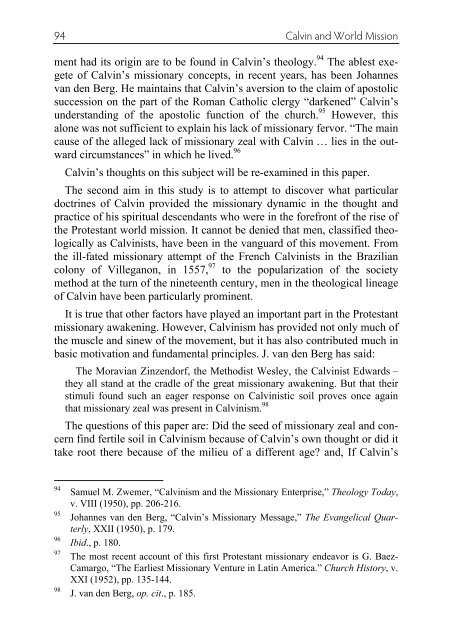Calvin and Missions - World Evangelical Alliance
Calvin and Missions - World Evangelical Alliance
Calvin and Missions - World Evangelical Alliance
Create successful ePaper yourself
Turn your PDF publications into a flip-book with our unique Google optimized e-Paper software.
94 <strong>Calvin</strong> <strong>and</strong> <strong>World</strong> Mission<br />
ment had its origin are to be found in <strong>Calvin</strong>’s theology. 94 The ablest exegete<br />
of <strong>Calvin</strong>’s missionary concepts, in recent years, has been Johannes<br />
van den Berg. He maintains that <strong>Calvin</strong>’s aversion to the claim of apostolic<br />
succession on the part of the Roman Catholic clergy “darkened” <strong>Calvin</strong>’s<br />
underst<strong>and</strong>ing of the apostolic function of the church. 95 However, this<br />
alone was not sufficient to explain his lack of missionary fervor. “The main<br />
cause of the alleged lack of missionary zeal with <strong>Calvin</strong> … lies in the outward<br />
circumstances” in which he lived. 96<br />
<strong>Calvin</strong>’s thoughts on this subject will be re-examined in this paper.<br />
The second aim in this study is to attempt to discover what particular<br />
doctrines of <strong>Calvin</strong> provided the missionary dynamic in the thought <strong>and</strong><br />
practice of his spiritual descendants who were in the forefront of the rise of<br />
the Protestant world mission. It cannot be denied that men, classified theologically<br />
as <strong>Calvin</strong>ists, have been in the vanguard of this movement. From<br />
the ill-fated missionary attempt of the French <strong>Calvin</strong>ists in the Brazilian<br />
colony of Villeganon, in 1557, 97 to the popularization of the society<br />
method at the turn of the nineteenth century, men in the theological lineage<br />
of <strong>Calvin</strong> have been particularly prominent.<br />
It is true that other factors have played an important part in the Protestant<br />
missionary awakening. However, <strong>Calvin</strong>ism has provided not only much of<br />
the muscle <strong>and</strong> sinew of the movement, but it has also contributed much in<br />
basic motivation <strong>and</strong> fundamental principles. J. van den Berg has said:<br />
The Moravian Zinzendorf, the Methodist Wesley, the <strong>Calvin</strong>ist Edwards –<br />
they all st<strong>and</strong> at the cradle of the great missionary awakening. But that their<br />
stimuli found such an eager response on <strong>Calvin</strong>istic soil proves once again<br />
that missionary zeal was present in <strong>Calvin</strong>ism. 98<br />
The questions of this paper are: Did the seed of missionary zeal <strong>and</strong> concern<br />
find fertile soil in <strong>Calvin</strong>ism because of <strong>Calvin</strong>’s own thought or did it<br />
take root there because of the milieu of a different age? <strong>and</strong>, If <strong>Calvin</strong>’s<br />
94<br />
Samuel M. Zwemer, “<strong>Calvin</strong>ism <strong>and</strong> the Missionary Enterprise,” Theology Today,<br />
v. VIII (1950), pp. 206-216.<br />
95<br />
Johannes van den Berg, “<strong>Calvin</strong>’s Missionary Message,” The <strong>Evangelical</strong> Quarterly,<br />
XXII (1950), p. 179.<br />
96<br />
Ibid., p. 180.<br />
97<br />
The most recent account of this first Protestant missionary endeavor is G. Baez-<br />
Camargo, “The Earliest Missionary Venture in Latin America.” Church History, v.<br />
XXI (1952), pp. 135-144.<br />
98<br />
J. van den Berg, op. cit., p. 185.

















